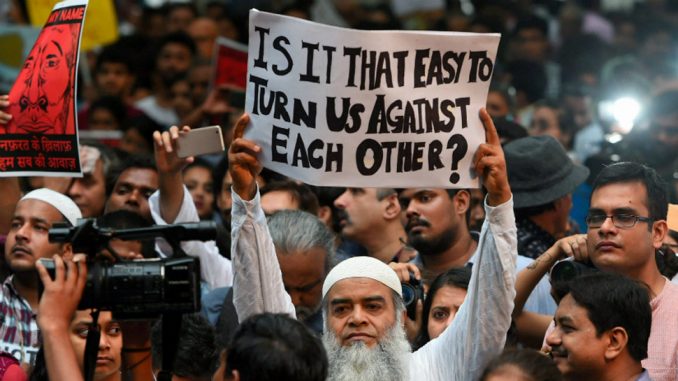
The Human Rights Watch mentioned cow vigilantism, the Armed Forces Act and manual scavenging, among the concerns, in its study.
Women, Dalits and religious minority communities lived under threat in 2017 as violence perpetrated by vigilante groups that claimed to be supporters of the ruling Bharatiya Janata Party continued unabated, finds the Human Rights Watch World Report 2017. The report, released by the New York-based non-profit, said the Indian government failed to curb such attacks while many senior BJP leaders indirectly “encouraged the violence” by publicly endorsing Hindu supremacy and ultra-nationalism.
The report said “the abusive” Armed Forces Special Powers Act is yet to be repealed in Jammu and Kashmir and parts of northeastern states. It said the government had yet to comply with a Supreme Court ruling that said civilian authorities should investigate allegations of violations by security forces. AFSPA gives soldiers who commit violations immunity from prosecution.
Speaking about the Kashmir unrest, it said several people were killed and injured as security forces tried to quell violent protests in the Valley. The report also mentioned the case of Farooq Ahmad Dar, the man the Indian Army had used as a human shield during a bye-election in Srinagar in April 2017.
The report said the government did not take any action in cases of lynch mobs attacking people from the minority communities, especially Muslims. Till November 2017, 10 people were killed in 38 such attacks, according to the report. “Indian authorities have proven themselves unwilling to protect minority religious communities and other vulnerable groups from frequent attack,” said South Asia director at Human Rights Watch Meenakshi Ganguly, according to The Wire. “There needs to be a serious effort to prevent future attacks and to prosecute all those responsible for the violence.”
It said the practice of manual scavenging was “inhuman”, and added that 39 people reportedly died from being trapped in toxic sewage lines between April and July 2017. However, the Prohibition of Employment as Manual Scavengers and their Rehabilitation Act, 2013, says it is illegal to employ manual scavengers and is necessary to rehabilitate them with a one- time package of Rs 40,000.
Freedom of expression was also curbed as the authorities slapped sedition and criminal defamation charges against government critics, said the report. Press freedom came under threat too in 2017. The report said “journalists faced increasing pressure to self-censor due to threat of legal action, smear campaigns and threats on social media”.
Women continued to find it difficult to report cases of rape and molestation. The report said they faced humiliation at police stations and hospitals while the two-finger test to determine rape was degrading.
The report also mentioned the death of more than 60 children at BRD hospital in Uttar Pradesh’s Gorakhpur district due to alleged lack of oxygen supply. It said the incident was a result of “state corruption and neglect”. The violent protest following Dera Sacha Sauda chief Ram Rahim Singh’s conviction in two rape cases, the Darjeeling unrest and the farmers’ killings in Madhya Pradesh also found mention in the report.
The report, however, hailed the Supreme Court rulings in 2017. It said the court orders “strengthened fundamental rights, equal rights for women, and accountability for security forces violations”. Among the notable rulings mentioned in the report are when the Supreme Court declared right to privacy a fundamental right under the Constitution; when it struck down the Islamic practice of triple talaq; and when the top court ordered an investigation into the 87 alleged unlawful killings by government forces in Manipur.
Source: Scroll.in

Leave a Reply